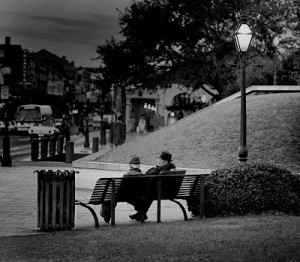The Grief That Takes You By Surprise
 Too many of my friends have lost parents this year. No matter what your age, it’s a shock to navigate that kind of grief. But as we grow older, we witness the deaths of the generations ahead of us: great-grandparents (if you’re lucky, like me), grandparents, parents/aunts/uncles. It’s normal. Expected. But then there are the losses that don’t feel normal, that aren’t expected.
Too many of my friends have lost parents this year. No matter what your age, it’s a shock to navigate that kind of grief. But as we grow older, we witness the deaths of the generations ahead of us: great-grandparents (if you’re lucky, like me), grandparents, parents/aunts/uncles. It’s normal. Expected. But then there are the losses that don’t feel normal, that aren’t expected.
My father was 75 when he died, the first one in his group of friends. They’d lost their parents long ago, but none of them had ever lost a close friend. And though at their ages that might sound like they were in denial, they weren’t. They knew it was possible. They just didn’t expect it to happen yet.
I was 16 the first time I went to the funeral of someone close to my age, the older brother of a classmate. He was in his early twenties, killed in Vietnam the first week he was there. The war was raging, but the losses did not begin to come close until that summer of 1968.
Through the years, there were other losses, mostly girls I went to high school with who died in car accidents, from cancer or suicide. Then the plague years of the AIDS epidemic took guys I was in theatre with, my coworkers, my assistant. By the time we reached our 50th birthdays, cancer seemed to be the #1 killer: ovarian, pancreatic, melanoma.
Not all of the losses were surprises to me. I knew they were sick, though not necessarily how sick. I felt guilty for not reaching out, staying in touch. It took losing a classmate on 9/11 to change my behavior, to make regular check-ins with friends a way of life.
Listen, I know there will always be shocking news to absorb. Death can’t be avoided, nor can the grief we feel when those friends are gone. Why then, do we seem so unprepared?
For a long time, I had no answer to that. Are we deep in denial? Are we unaware of the people surrounding us? Are we narcissistic?
Maybe, but the real reason, I believe, is that we’re scared.
We can always justify the deaths of people in the generation ahead of us. They were old, or at least older than us. But when people our age die, it hits us in a very different way. Because we have confirmation that it could happen to us, too, not at 90, but 30 or 40 or 50. And few of us believe we’ve accomplished enough to feel at peace about dying.
I’ll bet some of those friends of yours who died were at peace. Of course, some of them probably weren’t. And if you were able in any way to support them, you know what a gift that can be for both friends.
We’re all going to be blindsided some day by the death of a friend: whether it’s a terminal cancer diagnosis that left them with only weeks to live, or car accident or heart attack. Even if we had time to adjust to the idea that they were dying, we still grieve. It’s devastating and it’s not fair, but it’s life.
I can’t give you any suggestions on how to avoid this kind of grief. I can’t tell you how to fill the void left after your friend dies. Those of you who read this blog regularly already know what I’m going to say next: don’t wait.
Don’t wait until you have to give their eulogy to admit how much they meant to you. Listen, they already know, you insist. They probably do, but they might not. And let’s be honest: can you be told too often that you are loved?
No, I didn’t think so.
Tell them you love them. Make plans to hang out and write it in ink, not pencil.
And celebrate the joys of friendship.
https://youtu.be/BPTOY8FrvNw

